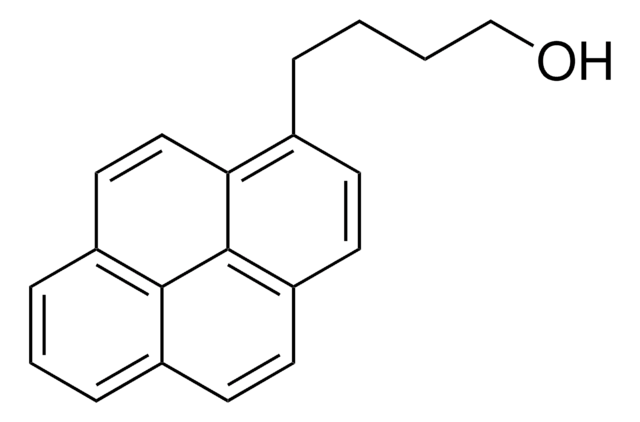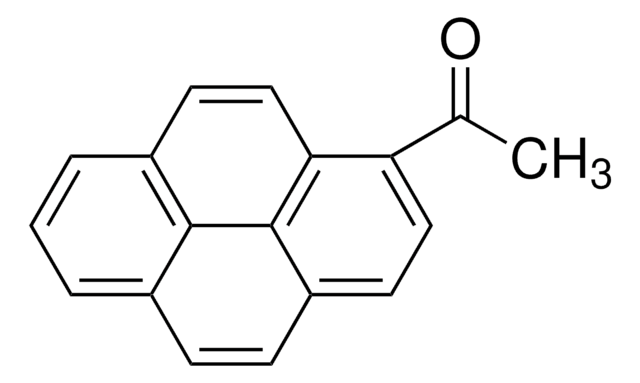All Photos(1)
About This Item
Empirical Formula (Hill Notation):
C17H10O2
CAS Number:
Molecular Weight:
246.26
Beilstein:
2375854
MDL number:
UNSPSC Code:
12352103
PubChem Substance ID:
NACRES:
NA.23
Recommended Products
Assay
97%
mp
270-272 °C (lit.)
SMILES string
OC(=O)c1ccc2ccc3cccc4ccc1c2c34
InChI
1S/C17H10O2/c18-17(19)14-9-7-12-5-4-10-2-1-3-11-6-8-13(14)16(12)15(10)11/h1-9H,(H,18,19)
InChI key
HYISVWRHTUCNCS-UHFFFAOYSA-N
Looking for similar products? Visit Product Comparison Guide
General description
1-Pyrenecarboxylic acid (PCA) is a polyaromatic derivative that has an amphiphilic characteristic. It is a fluorophore that shows absorption spectra in the UV region. PCA has a carboxylic acid group that attaches with pyrene nucleus. It can be used as a sensitizer that facilitates the electron transport from one medium to another.
Application
Functionalized pyrene for synthesis.
PCA can be used in the surface modification of graphene and carbon nanotubes (CNTs), which can further be used for a variety of electronic applications.
Storage Class Code
11 - Combustible Solids
WGK
WGK 3
Flash Point(F)
Not applicable
Flash Point(C)
Not applicable
Personal Protective Equipment
dust mask type N95 (US), Eyeshields, Gloves
Certificates of Analysis (COA)
Search for Certificates of Analysis (COA) by entering the products Lot/Batch Number. Lot and Batch Numbers can be found on a product’s label following the words ‘Lot’ or ‘Batch’.
Already Own This Product?
Find documentation for the products that you have recently purchased in the Document Library.
Customers Also Viewed
Amphiphilic pyrenecarboxylic acids: incorporation into vesicle membrane and ability as sensitizer for electron transport reactions
Sasaki R, et al.
Tetrahedron, 65(36), 7364-7371 (2009)
Yu Shen et al.
Biosensors & bioelectronics, 130, 367-373 (2018-10-01)
Paper-based biosensors are promising for low-cost diagnostics. However, its widespread use has been hampered due to a lack of sensitive detection methods that can be easily implemented on paper substrates. On the other hand, single-walled carbon nanotubes (SWNTs) -based chemiresistive
Optical and sensing properties of 1-pyrenecarboxylic acid-functionalized graphene films laminated on polydimethylsiloxane membranes
An X, et al.
ACS Nano, 5(2), 1003-1011 (2011)
S Mocanu et al.
Physical chemistry chemical physics : PCCP, 19(40), 27839-27847 (2017-10-11)
Electron paramagnetic resonance (EPR) and fluorescence spectroscopies provide molecular-level insights on the interaction of paramagnetic and fluorescent species with the microenvironment. A series of dual molecular probes bearing fluorescent and paramagnetic moieties linked by flexible short polyether chains have been
Sijia Ma et al.
Nanoscale, 12(14), 7895-7901 (2020-04-01)
Chiral nanostructures and their optical activity have been attracting great interest. Here, we designed an enantiomer bolaamphiphile containing a naphthalene moiety (bola-1) and an alkyl spacer, and investigated its self-assembly as well as optical activity. It was found that the
Our team of scientists has experience in all areas of research including Life Science, Material Science, Chemical Synthesis, Chromatography, Analytical and many others.
Contact Technical Service











